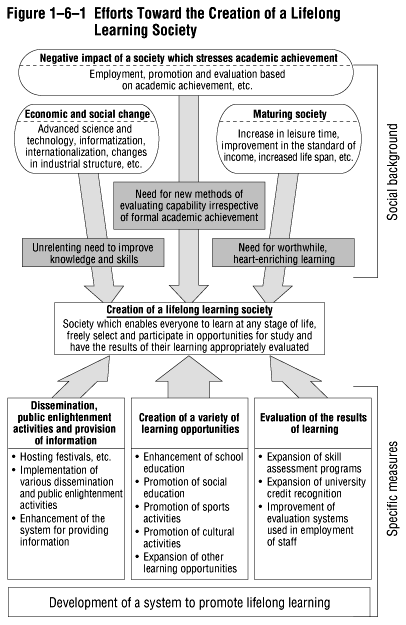| Home > Policy > White Paper, Notice, Announcement > White Paper > Japanese Government Policies in Education, Culture, Sports, Science and Technology 2001 >Chapter6 Section1.1 | ||
The National Council on Educational Reform has stated the basic concepts of educational reform today as follows. "In order for Japan to take the initiative in coping with changes in society and to build a vibrant society, it is essential to respond to a growing demand for learning resulting from the introduction of a variety of educational services and the progress of science and technology, and to comprehensively reorganize the educational system from one centered on schools to one that acknowledges the importance of lifelong learning and corrects the negative aspect of society's focus on academic achievement." Even today, the central agenda is considered to be the construction of a lifelong learning society that allows people to study by choosing educational opportunities at any time during their lives and duly appreciates those learning achievements. Especially in 21st century society, which is becoming increasingly knowledge-based, it is essential that all citizens improve their abilities throughout their lives so that they can exert such abilities to the fullest extent and contribute to the development of society. Therefore, the importance of lifelong learning is becoming more valuable than ever.
In order to create a lifelong learning society, the active use of IT not only provides various and abundant opportunities unconstrained by geography and time factors, but also stimulates people's motivation and interests in lifelong learning and opens new horizons for further possibilities. This clearly indicates that the promotion of lifelong learning and informatization of education are inseparable from each other.
Since the above-mentioned National Council on Educational Reform's report, the Government has been improving the system to promote lifelong learning; implementing policies for the enlightenment and provision of information concerning lifelong learning; providing various opportunities for learning through school education, social education, culture and sports; and implementing measures such as the utilization and evaluation of learning achievements. (Refer to Part 2, Chapter 1 for more detailed information concerning the contents of these policies.)
Through these measures, people's understanding of lifelong learning has increased and learning activities to enrich their lives, such as hobbies and health, have expanded. In the course of creating a lifelong learning society, there have been increasing demands for higher education to provide an upgrade to an individual's career and for an appropriate evaluation and utilization of learning achievements that can be used for volunteer activities. A survey conducted by the Prime Minister's Office, now the Cabinet Office (Survey on Lifelong Learning: December 2000, Press Office, Prime Minister's Office), also showed an increasing percentage of respondents choosing "volunteer activities and knowledge and skills necessary for them" and "knowledge and skills necessary for one's own profession" as subjects of lifelong learning that they wanted to pursue in the coming years.

| Back To Top | MEXT HOME |